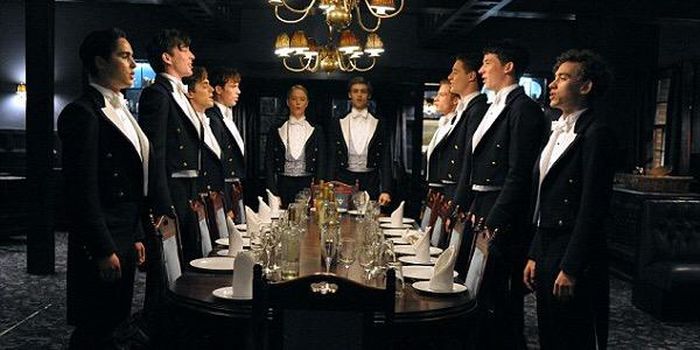Oxbridge on Film: The Man Who Knew Infinity
Aneesah Bari describes the feeling of finally experiencing the Cambridge seen in The Man Who Knew Infinity (2015), and compares its depiction with today’s reality.
Sitting in the Great Hall at Trinity College, flanked by three of my closest new friends, my eyes scanned the room in awe. I had been at Cambridge for a few months at that point, yet I still couldn’t help the momentary incredulity I was feeling. Undoubtedly, there are many enthralling sights at Cambridge that inspire awe far more easily than a dining hall. However, for me, as I sat down for my first formal at Trinity, my mind was immediately transported back to a depiction of that very same dining hall that I had seen in the film The Man Who Knew Infinity.
The film chronicles the journey of acclaimed mathematician Srinavasa Ramanujan (Dev Patel) from Madras, India (modern-day Chennai) to Cambridge. He arrives with no prior formal mathematical training, and makes ground-breaking contributions to mathematics – many involving problems that had been previously considered unsolvable. What Ramanujan was able to accomplish in the mathematical sphere is nothing short of extraordinary, but understanding his background and the challenges he faced in pursuit of these accomplishments makes them all the more inspirational. For Ramanujan, even the mere prospect of leaving India seemed initially unthinkable and in defiance of the Brahmin ordinances he had been brought up with. Adjusting to life in Cambridge presented an even more challenging set of cultural incongruences, foreign complexities, and discriminatory interactions, and this stark contrast between his upbringing and his new academic environment is highlighted in the film. Set against the backdrop of the First World War, it poignantly unravels the hardships and the triumphs of Ramanujan’s journey, seeing him eventually become the first Indian to be elected to a Fellowship at Trinity College.
“The spirit of ambition encapsulated in the film is, in my opinion, its most endearing quality.”
The film encapsulates something that many young academics, including myself, find alluring about Cambridge. Sitting down for my own formal, it almost felt unreal that I was sitting in the same hall that I had seen on screen a few years prior. It felt even more unfathomable to think that just over a century ago, a man who was about to face and eventually surmount preconceived biases, racial prejudices, and an institutional hierarchy set up against his success would have been sitting down for his first formal there too.
While one can hardly disagree with the fact that the modern-day incarnation of that same academic environment is certainly not freed from (in some instances) its deeply prejudicial roots, I think that his story as depicted in the film can serve as a reminder of what one can accomplish, even in the face of seemingly insurmountable barriers. It is a reminder that we break down barriers and shatter glass ceilings in academia from within, and that Cambridge still exists as a place where students are given a prime opportunity to shatter whatever ceilings they set their sights on. The Man Who Knew Infinity captures this opportunity, while also not shying away from the challenges that sometimes come with it, and its poignant depiction of this duality is the reason I found myself thinking about it a lot in my time as a student.
The film represents what Cambridge represented to me when I applied – the aspiration to attain goals more ambitious than one might even conceive to be possible. For me, (while I admittedly do not have it in me to dream up colossally impactful mathematical functions or theorems) the comparatively more modest prospect of gaining admittance to Cambridge was one of those goals. The spirit of ambition encapsulated in the film is, in my opinion, its most endearing quality. It is one that might serve only to inspire, hopefully, countless students sitting down for their first formals, or getting ready to embark on their academic journeys wherever they may be. This film is a statement, both obvious and implicit, that with hard work and that same spirit of ambition, perhaps, a century from now, someone might be making a film about them too.
 News / Eight Cambridge researchers awarded €17m in ERC research grants27 December 2025
News / Eight Cambridge researchers awarded €17m in ERC research grants27 December 2025 News / Clare Hall spent over £500k opposing busway 24 December 2025
News / Clare Hall spent over £500k opposing busway 24 December 2025 Comment / League tables do more harm than good26 December 2025
Comment / League tables do more harm than good26 December 2025 Comment / The ‘class’ of Cambridge24 December 2025
Comment / The ‘class’ of Cambridge24 December 2025 News / Caius mourns its tree-mendous loss23 December 2025
News / Caius mourns its tree-mendous loss23 December 2025









